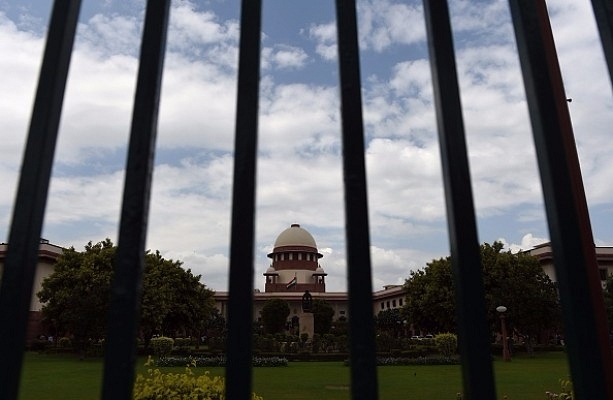Politics
Speedy Trials For Legislators: Trespassing On A Core Tenet Of Democracy?
- Why should a member of the political class enjoy a speedy trial while a member of the public has to sweat for years in criminal cases and, in some cases, be jailed as under-trial prisoners?

A view of the Supreme Court in New Delhi (SAJJAD HUSSAIN/AFP/Getty Images)
In a decision that widens the difference between the legal regimes for the political class and for the citizenry, the Supreme Court has issued an order on 1 November to create fast-track courts to deal with criminal cases involving members of the central and state legislatures.
Before I dive into the consequences of this decision and my personal commentary on it, we must understand the background.
The system of fast-track courts was first set up in 2000, and listed under suggestions by the Finance Ministry to improve the administration of justice in the country. The union government partly funded the creation, while state governments were tasked with infrastructure creation as well as meeting the residuary cost of setting up the courts. The scheme was supposed to end on 31 March 2005.
The Supreme Court, which was already “monitoring” the functioning of fast-track courts through the case of Brij Mohan Lal v Union of India & Others, ordered that the functioning of fast-track courts be continued for a period of five more years, till 2010. The scheme was then extended to one more year, and it ended in 2011.
Was the idea of fast-track courts successful?
As many as 1,734 fast-track courts (1,564 after 2005) disposed of 32.34 lakh cases of the 38.90 lakh transferred to these courts, leaving 6.56 lakh cases pending for disposal.
While fast-track courts can therefore be considered moderately successful, the pendency of cases in the judicial system has been reduced only by a small amount.
The Supreme Court had in Public Interest Foundation v Union of India directed that the trials of legislators be conducted in an expeditious manner such that they conclude within a year of the framing of charges. The chief justice of each respective High Court was tasked with the duty to issue appropriate directions to the trial court to ensure speedy trial.
In the current case, the Supreme Court has asked the centre for data regarding the effectiveness of the earlier Supreme Court order, and further tasked the central government with the duty to frame a scheme to ensure the speedy trial of public representatives. This direction of the Supreme Court widens the ambit of privileges that the members of the state and central legislatures enjoy. Why should a member of the political class enjoy a speedy trial while a member of the public has to sweat for years in criminal cases and, in some cases, be jailed as under-trial prisoners?
There is no doubt that the intention of the petitioner and the Supreme Court is a good one: to strike at the criminalisation of politics. However, good intentions do not make the order “right”. Legislators already enjoy a set of privileges that are very expansive in nature, and now a speedy trial in criminal trials is another one that they will enjoy.
If the Supreme Court’s interest was to reduce the pendency of cases, why not extend the domain of these fast-track courts to cover the cases of the citizenry as well?
In another scenario, imagine if the Parliament of India had enacted a legislation to the same effect that the Supreme Court has proposed, or if the Ministry of Law and Justice proposed the same. Would the “civil society” of the country cry foul at that exercise?
Yes, and rightfully so, for it violates the most basic principle of equality that is guaranteed under Article 14 of the Constitution and is an action most foul, which widens the gap between the citizens and the (ruling) political class.
It is one of the most basic principles of democracy that members of the ruling class be subject to the same law and legal system as the citizens are. Is the Supreme Court not striking at this very root of democracy?
There is another dynamic that one must question the Supreme Court on. The Court is yet again straying into the domain of the legislature and practically making the law. While administration of justice is the domain of the judiciary, it does not entail the power to direct that a separate system of courts be created. The creation of such courts is to be done by the legislature through an enactment, or by the executive, as the case may be.
This action of the Supreme Court, however, is routine nowadays. The Supreme Court has effectively taken a policy decision for the Ministry of Law and Justice, and has decided in its self-righteousness to continue to propagate an unequal legal regime.
Introducing ElectionsHQ + 50 Ground Reports Project
The 2024 elections might seem easy to guess, but there are some important questions that shouldn't be missed.
Do freebies still sway voters? Do people prioritise infrastructure when voting? How will Punjab vote?
The answers to these questions provide great insights into where we, as a country, are headed in the years to come.
Swarajya is starting a project with an aim to do 50 solid ground stories and a smart commentary service on WhatsApp, a one-of-a-kind. We'd love your support during this election season.
Click below to contribute.
Latest